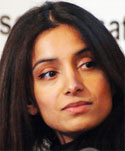
By Deeyah Khan
21 June 2015
At the beginning of this year, al-Khansa brigade uploaded its Arabic manual for women in Islamic State. The 10,000-word document advises that Muslim girls are married between the ages of nine and 17, cover their bodies and faces and live in seclusion. Meanwhile, women and girls as young as 10 from Iraq’s minority sects have been enslaved and raped.
Yet Islamic State’s ability to attract women is unprecedented. By May, 60 women had left the UK to join. Over the past few days, three sisters left Bradford to join their brother, taking with them nine children. Why would any woman submit herself and her children to the hazards of a war zone for the opportunity to live in a state of near chatteldom?
Attempts to explain this often jump to the concept of the Jihadi bride. Since most of the women are adolescents, it is assumed the “holy warriors” of the Islamic state have a dangerous sexual allure, like a boy band accessorised with beards and semi-automatic weapons.
However, most of the recruitment of women is carried out by women themselves, so assuming the only factor is a teenage crush trivialises their decision-making. Often, women’s participation in Islamic State does not require a gendered explanation. They can be just as bloodthirsty, disaffected and politically engaged as men.
As for the constricted lives they will encounter, some can be attracted to the security of traditional family roles. Although Hitler’s roles for women were limited to Kinder, Küche, Kirche (children, kitchen, church), almost half of the votes he gained were from women. They preferred a model of gender relations that allowed them a degree of domestic autonomy and status as wives and mothers – if nothing else. Indeed, some Muslim women in the UK already live under circumstances almost as constrained as in Islamic State due to the restrictions of family “honour”. For these women, Islamic State presents a route of escape. Some who seek to counter parental controls may turn to scripture, to use a language that carries weight within their households.
A great deal of racist violence is also directed at Muslim women, who are more visible than men. This can leave women isolated and fearful; hyper-aware of their identity, which marks them out for hostility. There are many reasons why a person might become interested in more radical interpretations, from spiritual curiosity, an awakened political awareness or a wish for a more “authentic” identity. Each journey has its own beginning, but each is a quest – for meaning, identity, community; for answers. Few of these quests dispatch women and girls to the Turkish border, but for some, particularly those who are naive, isolated and lacking social and emotional support; these are the first steps towards adopting extremism. While making my documentary Jihad, I interviewed several women involved in radical movements. One told me that because of sexual abuse she felt a desire for justice and had no faith in the British system that had failed her. The stonings and beheadings carried out under the name of justice in Raqqa’s “heaven square” (nicknamed “hell square” by those living under Islamic State’s occupation) may well have suited her thirst for retribution. She told me that a sense of comradeship with pious young women helped her feel safe and protected; that her status as a mother was honoured: that it gave her life a sense of purpose. Eventually, she left, saying the experience left her feeling spiritually hollow. But for women like her, dealing with exclusion, pain and disaffection, Islamic State is only a click away.
Exposure to traumatising online propaganda materials, such as scenes of the murder and massacre of Muslims, induces anxiety and arousal, burning these perceptions deep into the psyche. Very real injustices and outrages against Muslims become amplified; a complex reality can become distorted into a simplified worldview, where sinister forces pose a deliberate, existential threat to Islam. This belief becomes nourished and echoed across a network of like-minded individuals, until it drowns out more nuanced understandings.
Young people are particularly vulnerable to this black-and-white worldview, in which the in-group becomes understood as wholly noble, righteous and oppressed, and the enemy as devious, cruel and domineering. Within this schema, terrorism presents itself as heroism, a defence of home and community and values held sacred, from white supremacists such as Anders Breivik to the nationalism of the IRA. Islamic State positions itself as a place of refuge, a shining mirage in which Muslim fantasies can come to a glorious fruition, where domination and power can be reclaimed. This functions through one of the most powerful and most dangerous resources in history: youthful idealism, through directing it towards the exhilarating prospect of building a new and “perfect” society.
To discourage women and men from joining this brutal movement, we need to heal the vicious cycle of violence, fear and hatred which is growing between communities, and to move towards a future that includes us all. We need to move away from the divisions of us and them and build on our shared humanity. We need to be open and honest about the driving factors of radicalisation from the violent foreign policies, the impact of the war on terror, family and psychological problems, discrimination and ideologies of hatred. This way we can try to avoid the tragic loss of more of our children; who believe themselves to be opening a new morning for humanity while stumbling in the night, over the bones of the dead.
Deeyah Khan is a film director who made Jihad – A British Story, shown on ITV last week.
Source: http://www.theguardian.com/world/2015/jun/21/isis-women-its-not-about-jihadi-brides-its-about-escape




 Moderate Islamist here
Moderate Islamist here


0 comments:
Post a Comment